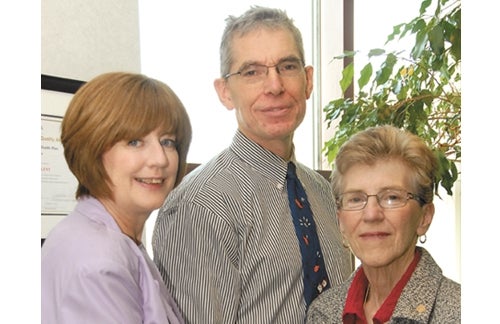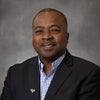House Calls Make A Comeback
Everyone seems to agree that the cost of health care in America is too high. But finding consensus on exactly how to curb escalating health-care costs is much harder to come by.
While debate continues to rage on about the effectiveness of both federal and state health-care reform, local providers are experimenting with innovative solutions and finding success.
Follow The Numbers
Worcester-based HMO Fallon Community Health Plan has teamed up with the physicians group Fallon Clinic and VNA Care Network & Hospice to run a program called Home Run that is focused on improving treatment — and reducing costs — of elderly patients.
The program leverages in-depth claims data, predictive modeling and physician referrals to identify patients in the community with chronic conditions that are at high risk for costly complications and hospitalizations.
Once the patient has been identified, he or she is enrolled in the program and the real work begins.
The innovation in this case is really a return to more traditional medical practices. The house call, as it turns out, is making a comeback.
“Most of our patients in this program have had the experience at some point in their childhood of doctors coming into the home,” said Dr. Charles S. Mills, a member of Fallon Clinic who specializes in geriatric medicine. “It’s familiar to them.”
Mills is the primary doctor for the Home Run program, which was launched in 2009.
“Medicine has become so technology-driven,” said Mills, “but maybe we’ve lost something: the conversation.” Visiting with patients in their homes provides a relaxed and comprehensive experience that aims to combat rising health-care costs by catching problems before they become serious medical issues, managing certain conditions on the spot and assessing the lifestyle and challenges of patients.
The patients receive one-on-one care, with an amazing reserve of resources at the ready and a nurse on-call at all times. The primary care physicians — who, incidentally, have so far been eager to refer patients to this program — have an extra arm of support in keeping clients healthy and happy. And the insurance companies welcome any opportunity to help defray the skyrocketing costs of hospitalizations and surgeries for their geriatric populations.
But more to the point, Home Run aims to keep elderly and aging patients in good health — social, emotional and physical — by assessing them in the comfort of their own homes where they can be honest and feel safe to express themselves. Furthermore, there is no need for patients to arrange rides to and from appointments, one of the many obstacles that may contribute to poor self-care and eventual illness or issue.
“There are a whole host of reasons people don’t maximize their options,” said Susan Legacy, senior manager of the case management department at FCHP. In addition to transportation, there is the universal issue of finances.
“We’ve seen patients who have decided, on their own, to take a certain pill every other day in order to save money,” Legacy said. “And being in their homes, we can see these things and address them on neutral territory, which feels much less threatening than a doctor’s office.”
Initial results on the program are promising. The health-care bills for patients in the program have been reduced on average by 30 percent. FCHP continues to further evaluate the program through patient satisfaction surveys, tracking emergency room usage and admissions to hospitals or skilled nursing facilities.
Inside Information
While the dollars saved through the program are important, there are benefits that are also harder to measure. In this program, visiting professionals have access to information about their clients based on simple observations. For example, they might have an opportunity to assess the contents of patients’ refrigerators, which can lead to on-the-spot advice about foods and drinks that are in conflict with particular medications. They can observe roadblocks to accessibility in the home, and also get a grasp on what kind of family network the patient enjoys, helping staff to tailor social services.
To accent the program, FCHP has created a Home Run Club, which is open to all participants in the program and consists of a social meeting with light snacks and plenty of opportunities for the creation of new friendships as well as transportation.
The idea for the program has been germinating with the creators for quite some time, according to Legacy.
“The Home Run Program is the result of conversations that have been going on for a couple of years,” she said. “We wanted to find innovative ways to provide a higher level of care, and yes, partly because we are either dealing with parents who are aging or have been through it already and were not satisfied with the options we had.”
“This is truly a quality service for the patient,” said Barbara Brooks, vice president of clinical services for VNA Care Network & Hospice, who oversees visits to the home beyond normal calling hours by the staff at Fallon Clinic. “They do not want to be in and out of the hospital, but often they are afraid to call the doctor’s office.”
The social-emotional needs of the patients in the Home Run Program require thoughtful consideration, according to Mills. The aging process, he asserts, takes a toll on individuals who once enjoyed life without complication.
“We have this dream, as human beings, that we are going to live life fully until the very end,” Mills said. “In fact, disappointingly to many humans, it’s a trajectory.”
One of the strengths of the home Run programs is in its staffing — according to Mills, everyone involved with running the program has a phenomenal understanding of and sensitivity to those struggling with the aging process.
“We are seeking to, in the face of these changes, sit with our patients and have those difficult conversations with them in a space that is comfortable and familiar,” Mills said. “We are going to ask them, ‘How are you feeling about these changes? What are you thinking? What matters to you?’ ”
Amanda Roberge is a freelance writer based in Leominster.











0 Comments